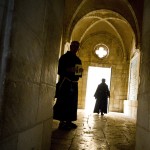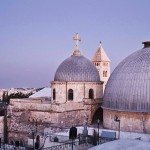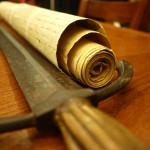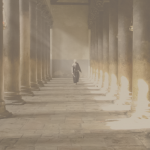and the kings of the earth do bring their glory and honour into it.
And the gates of it shall not be shut at all by day: for there shall be no night there.
And they shall bring the glory and honour of the nations into it.
Ap 21,24-26
To live forever in the Holy Land
Giving away one’s money to the poor is an act at the very roots of human life, because it is accepting the way of life of Christ, who “for your sake became poor although he was rich, so that by his poverty you might become rich” (2Cor 8:9). The apostle Paul presents contributions for the poor as a grace, a sharing, a love in which the generosity and grace of the Lord can be seen in action (Rom 15:25-27).
The strong bond between God and the Holy City was expressed on several occasions in the Old Testament. The earthly Jerusalem, mother of all peoples, has always been linked to the heavenly Jerusalem. The Patriarch Jacob in fact saw a stairway connecting the two cities and “the angels of God were ascending and descending on it” (Gen 28:12). Affirming that “God will not enter the heavenly Jerusalem before entering the earthly Jerusalem” (Talmud, Taanit 5a), the tradition recognizes that everything in the Holy City has its counterpart in the celestial Jerusalem.
A centuries-old tradition
Making a legacy in favor of the Franciscan Friars of the Holy Land means to be part of a centuries-old tradition. The charm of this Land and the desire to see it first hand have led many, from the earliest centuries of the Christian era, to confront all sorts of obstacles and dangers in order to be able to walk on and touch the places which witnessed the birth, death and resurrection of the Son of God. And there are numerous accounts making reference to pilgrims who sent their own personal donations to aid the sanctuaries and Holy  Places, in order both to meet the needs of the poorest and to maintain a link with Jerusalem. The unity with our brothers in Christ in the Holy Land, following the example of St. Paul, has thus since the beginning been carried out with real acts of charity, made during life or after death. Much of the land on which today there are sanctuaries comes from donations of pilgrims who decided to allocate part of their inheritance to this blessed land. The simple people gave food and animals: camels, ponies, horses, pigs, sheep, poultry and doves. For a pilgrim, to donate was and remains a gesture of belonging to the Mother Church of the Holy Land and this is why everyone gives what he or she is able to, since the value arises from the intention of the act, which is pure charity.
Pontiffs and the Holy Land
The Roman pontiffs, throughout the course of history, have not only expressed their benevolence toward the Holy Land with spontaneous alms, but have also striven with all their might that such gestures be imitated throughout Christendom. Pope Urban IV, a former papal legate in the Holy Land, sought to have all the clergy in France leave a tenth of their property to the Church in Palestine, and Benedict XIV ordered all preachers to speak at least four times a year to the people about the Holy Land and urge them to “remember the Holy Places in their last will and testament, leaving them some alms or pious legacy”.
The popes also conceded plenary indulgences to all those who, in their wills, remembered the Holy Land. In recent times, the popes who have gone to the Holy Land on Pilgrimage – Paul VI in 1964, John Paul II in 2000, Benedict XVI in 2009 and Francis in 2014 – have all strongly emphasized the theme of support from the whole world for the Christian communities of the Holy Land. During his homily on Manger Square, Pope Benedict XVI directed these words to the Christians of Bethlehem: “Do not be afraid! Count on the prayers and solidarity of your brothers and sisters in the Universal Church, and work, with concrete initiatives, to consolidate your presence and to offer new possibilities to those tempted to leave.”
Thank you for your interest.





